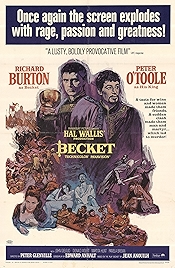A movie for every day of the year – a good one
10 November
Richard Burton born, 1925
On this day in 1925, Richard Walter Jenkins was born, in Pontrhydyfen, Wales. Richard was child number 12 and his mother later died giving birth to child number 13; his father was a coal miner, drinker and gambler.
A star athlete, young Richard adopted the name Burton after his drama teacher, Philip H Burton, de facto adopted him, and it was Philip Burton who worked on the young man’s voice, turning it from a tinny nasally thing into the sonorous boom that was to make him (along with his Roman god looks and acting ability) his fortune.
Eventually nominated seven times for an Oscar, though he never won one (a record), Burton arrived in the world of film having already conquered the London and Broadway stage, his first film being the British production The Last Days of Dolwyn, for which he got good notices. His first Hollywood movie was 1952’s My Cousin Rachel and it made him an international star.
Through the 1950s and early 1960s Burton alternated London theatre, Broadway musical (he was a smash hit in Camelot) and Hollywood movies, pausing to also conquer radio with his recording of Dylan Thomas’s Under Milk Wood, still definitive.
In the 1960s he became famous for marrying Elizabeth Taylor, appeared with her in her best film, Who’s Afraid of Virginia Woolf, and descended with her into alcoholism.
By the 1970s his drinking was so bad that it was affecting his career and his strength; his body was wasting away. Still, he was still outwardly in good enough shape to make The Wild Geese, the creaky British action drama in which Burton starred alongside Roger Moore and Richard Harris as the world’s oldest, fattest crack team of go-anywhere troubleshooters.
In 1984, having just made the film adaptation of Orwell’s Nineteen Eighty-Four, he died of a stroke, aged 58, an old man.
Becket (1964, dir: Peter Glenville)
Great in so many ways, Becket is the film for seeing two titans of the screen at their absolute prime.
Richard Burton is Thomas Becket, the Archbishop of Canterbury, Richard O’Toole is King Henry II. Both are friends who have become increasingly distant with the years, the film catching them at the point where it becomes easier for Henry to get rid of the “meddlesome priest” rather than have to argue with him again about whether God or the King is pre-eminent, and whether the indigenous Saxon is being too keenly oppressed by the Norman invader (of whom Henry II is one).
Apart from the performances, titanic as already said, Becket offers a complex play that is at least in part about the conquered French people’s relations with the Nazi victor – to collaborate or not? – which still works all these decades later, even if Jean Anouilh (the writer of the original play) has to torture history slightly to make events fit. And Anouilh’s injection of a homosexual subtext is also a distortion of real events, though it does add a spark to what is, after all, a love story gone bad.
Language was Burton’s first love and Edward Anhalt has done a brilliant job with Anouilh’s play, turning Becket into another example of the joustingly witty historical drama that the 1960s seemed keen on (A Man for All Seasons, Spartacus), a feat which has eluded the decades since. To even up the balance sheet a bit, it is an amazingly stagey film and seems to propose a medieval England lit with arc lamps (this, too, was a 1960s thing) and a king’s crown clearly made of cardboard. But when the rest of a film is this good, it seems almost rude to point things like that out.
Why Watch?
- Richard Burton and Peter O’Toole
- An intelligent, funny, genuinely dramatic script
- A great supporting cast including John Gielgud, Sian Phillips and Donald Wolfit
- Nominated for 12 Oscars, won one – a record number of near-misses
Becket – at Amazon
I am an Amazon affiliate
© Steve Morrissey 2013

